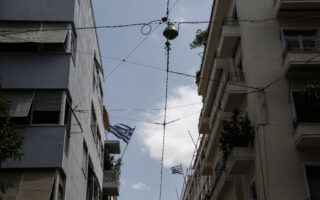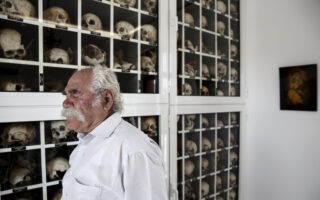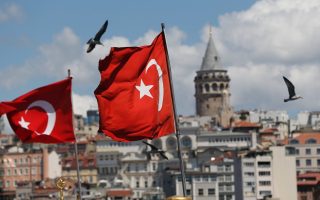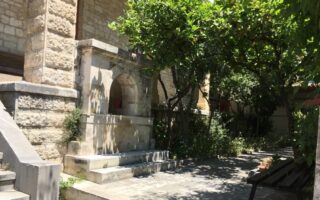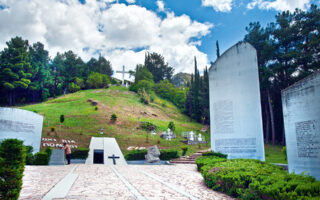A century in a political dynasty
Artemisia Lymberaki looks back on her life as sister of former PM Konstantinos Mitsotakis and aunt of the incumbent Kyriakos Mitsotakis
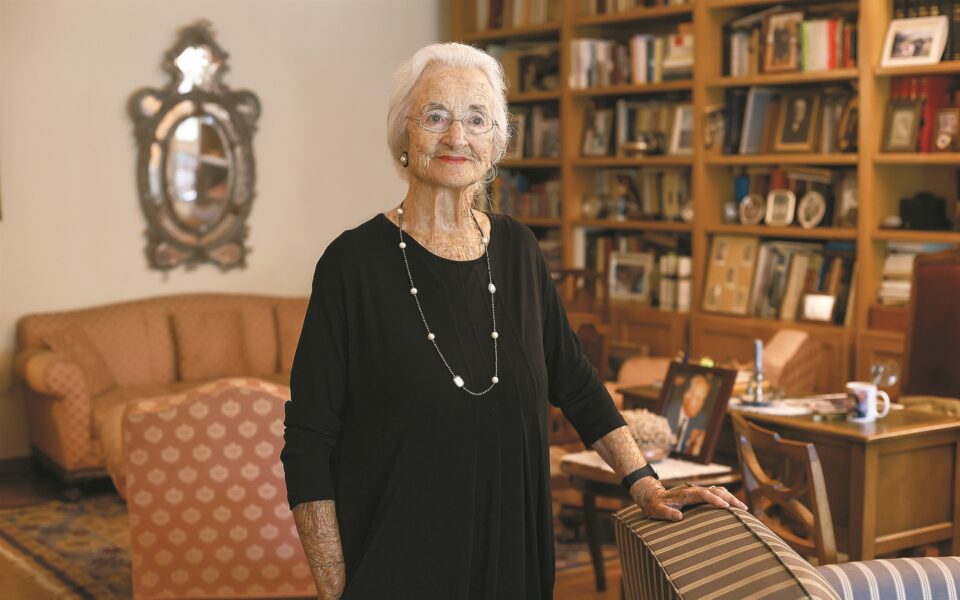
A photo of an aged and sartorially impeccable Eleftherios Venizelos taking a swing at a golf ball was the first thing to catch my eye in the elegantly old-world apartment near the former royal palace in downtown Athens. I was there to meet with Artemisia Lymberaki, the youngest sister of the late prime minister Konstantinos Mitsotakis (1918-2017), aunt of the current premier, Kyriakos Mitsotakis, and great-aunt of Athens Mayor Kostas Bakoyannis.
As I perused the photograph of Greece’s greatest 20th century statesman – a man who accomplished so many ambitious national goals in his day yet was defeated by the ultimate one – I wondered whether he realized that another one of his successes concerned the future of the political dynasty to which he belonged. After all, he inherited the Liberal Party from the elder Kostis Mitsotakis (1845-1898), who had founded its successor, the Barefoot Party, in 1878.
The Mitsotakis family has been in politics for 145 of the 200 years since the establishment of the modern Greek state, so any member of it has seen history being written in their drawing rooms.
I made myself comfortable in an armchair set beside an unornamented fir tree that had obviously been there since Christmas. Lymberakis immediately discerned my puzzlement and said, almost apologetically: “Kostas Bakoyannis brought it from Karpenissi for the holidays. It had been freshly cut just a few hours earlier. It has kept its scent and has not shed its needles, so I keep it here because it give me a lot of pleasure.”
At the age of 91, she too is a perennial, elegant and still beautiful, exuding that erstwhile quality of graciousness that comes from character rather than background. “I never had airs. People kept saying I was beautiful, but it never registered. I always leaned on others; I felt like nothing on my own. At first, I leaned on my mother, then on my husband, who passed away 12 years ago, after 56 years of marriage. Right there, in that chair,” she points, as if he is still with us.
‘I grew up feeling loved and carefree, looked after by my siblings. That all changed in 1941 with the German bombing of Crete’
“I’ve had to reorganize my life ever since Giorgos passed so I can bear it without him,” she says. “I deliberately stopped thinking too much and threw myself into reading. I fill my time with excellent books and good films. At this age, every new day is a gift. That I can stand, without physical impediment, is a gift. I have an obligation to do something with these gifts; not to fritter them away. And I do. That’s why I still have this tree. In my mind, it’s like being in a forest.”
I think about all the things she has seen in her life, which began in 1932 in Hania, Crete. “I even remember Venizelos’ funeral, the sea of people that came by the house. I was the youngest in the family and had a wonderful childhood in Galaria, Hania, until the war. I have lovely memories of my parents, who were second cousins and got married because they were deeply in love. I grew up feeling loved and carefree, looked after by my siblings. That all changed in 1941 with the German bombing of Crete,” says Lymberaki.
The resistance
“I remember the sky literally going dark with paratroopers parachuting from the Stukas and the Cretans killing them in midair. My family went through an enormous ordeal that took such a toll on my father’s health, he died. Kostas, a lad of 23, became the head of the National Organization of Crete resistance movement. I had a mother who was very optimistic because she was very brave. She watched her firstborn son leave in the night, carrying his gun, as the rest of us got ready for bed after a family dinner. We didn’t know whether we would ever see him again. I remember being wracked by agony every time my daughter was late coming home when she was growing up, so I couldn’t help asking my mother how she did it. She said: ‘Having backbone is a source of great strength. That’s what made him do what he did. And any hesitation whatsoever could have proven fatal, so I never questioned his motivation. I also didn’t sleep a wink until I heard the front door creak open every morning and knew he was back, alive.’ It was an enormous life lesson for me,” remembers Lymberaki.
When Lymberaki was 10 years old, she also played a part in the resistance, accompanying a Greek-speaking British army major who had moved into their house and dressed up like a Cretan every day to spy on the German positions while pretending to be out for a walk. She was also responsible for hiding the electrical telegraph the family had to convey messages to the British among the rooftop tiles.
The occupying forces eventually learned of the family’s contribution to the resistance and Kostas was arrested, court-martialed and sentenced to death. “My father was in despair. He went to speak with the German commandant but the situation was hopeless. Even if he wasn’t shot, he would end up – an even worse fate – in a concentration camp,” Lymberaki remembers.
“My father was so distraught on his way back home that he completely lost sight in one eye and that eye had to be removed immediately in order to save the other one. We found a doctor but he had no anesthetic, so they tied my father down and my mother held him tight, and they removed the eye while he was fully conscious. He was never the same after that. Later, while we all thought there was no hope for Kostas, the Germans decided to make a goodwill gesture to mark March 25 [Greece’s independence day] and pardoned 25 inmates who had been slated for execution, choosing them by draw. Kostas was one of them. As they walked out of the prison and heard the ‘Heil Hitler,’ they all raised their hand, except for him, who held his arms tightly at his sides,” she adds.
That day, she says, may have been the happiest in Konstantinos Mitsotakis’ life, even over the course of his ensuing political career. What was the hardest, I ask. “The Apostasy,” she answers, referring to the decision to break from Georgios Papandreou’s Center Union in July 1965. She says it was the only decision he could have made to prevent the dictatorship that came a few years later. I also asked her how she felt about reading a story in the Avriani newspaper accusing her brother of being a Nazi collaborator. “I knew that he was ready to give his life, that he was convicted to death, twice, and that we lost our father because of it – and that this was something that weighed heavily on Kostas throughout his life. Nowadays, if I am upset by anything, I process it first and then I erase it from my mind. My memory when it comes to unpleasantness is deliberately short,” she says.
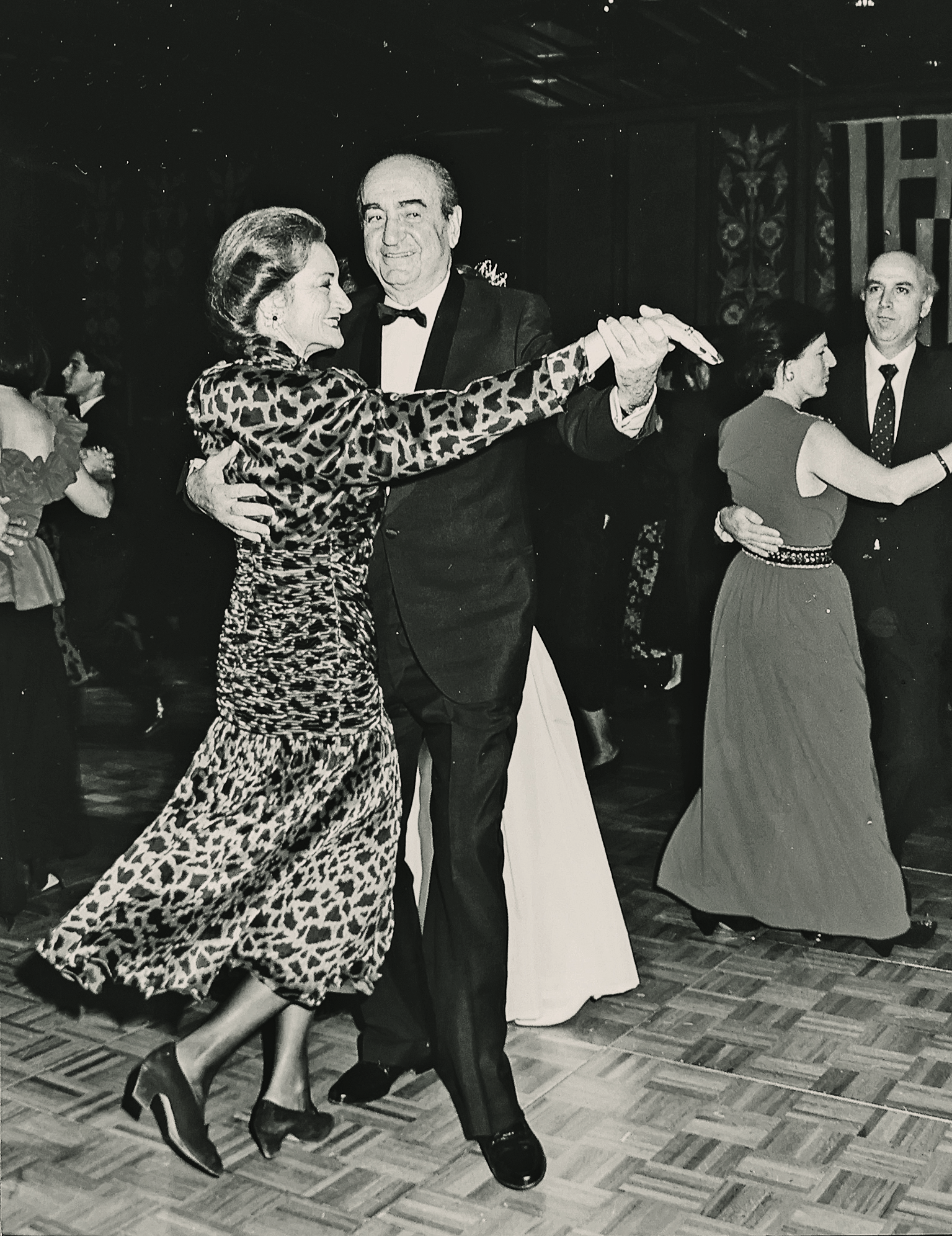
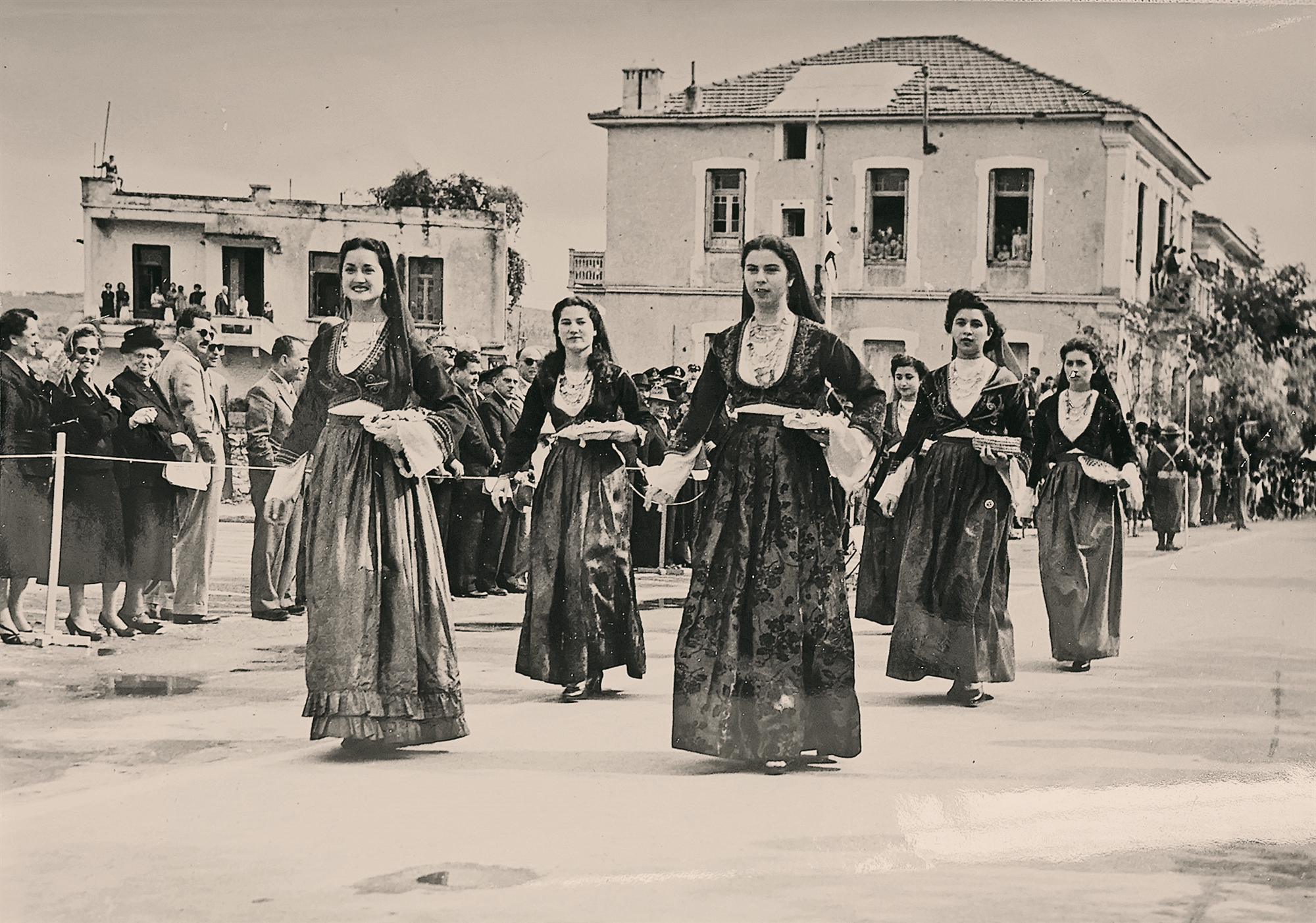
Husband, father, prime minister
What kind of person was Konstantinos Mitsotakis? “Like our mother, he was not very demonstrative. He would be leaving on a long journey and would say goodbye as if he was going out into the neighborhood. A friend of Kostas’ used to tease us and say that our family was more like a Swedish one than a Cretan one. I wasn’t like that though. I was very affectionate and constantly tried to get my mother to caress me. I’d put my head down in her lap all the time. Marika [Konstantinos Mitsotakis’ wife] was also very affectionate and she’d see this and say: ‘Give the child a caress; can’t you see how much she wants it?’ But she never did. That said, she gave her soul entirely to us. She was my foundation and my day could not start unless I spoke with her,” reminisces Lymberaki.
Everything changed for Konstantinos Mitsotakis when Marika, nee Giannoukou (1930-2012), came into his life. “What a beauty she was! Those eyes! Enormous. An outgoing and tender person, she had been through a lot as a child after contracting polio. She was very young, and she had to go to New York where she underwent pioneering surgery from a Greek doctor so she could walk. She was bedridden for years. He had rebuilt her entire spine, vertebrae by vertebrae. Imagine what her nervous system was like after that. She met my brother after she got back on her feet and she transformed his life. He fell passionately in love with her and gradually started speaking to her so tenderly, I hardly recognized him,” she remembers.
The couple married and wanted a big family but did not know whether this was possible given Marika’s health problems, says Lymberaki. “They visited a doctor and he said: ‘Mister Mitsotakis, her spine can support pregnancy, a hundred children, but her nervous system is completely shattered. Will you be able to stand that, because it won’t be easy?’ He smiled and assured the doctor he had the strength, so they started their family. He was incredibly tender toward her always, there for all the troubles. He was there for the births, giving her peace and courage, and there later when more serious problems emerged. He was there when she was paralyzed and he was there at the end too. She died surrounded by love,” says Lymberaki.
Yes, she admits, the strain from her nervous disorder could be great. “I remember him being in despair at times. She would simply explode with temper at times and gave him a lot of trouble, especially with his ministers. If she didn’t like someone or someone said something bad about her husband… we all trembled. But my brother never stopped loving her and I believe that he would not have accomplished as much as he did in politics if he didn’t have Marika at his side.”
Was he as affectionate as a father as he was as a husband? “If you ask my niece Katerina, she will say that he hardly said good morning to his children and would not even say good night if he was in a troubled mood. All of that changed as soon as they found themselves all together, in exile in Paris,” says Lymberaki, referring to the period of the 1967-1974 dictatorship in Greece. “The children understood who Kostas was and he got to know his children. They bonded, they spent time together, they talked. He would take them with him to the market shopping. Marika got pregnant just before they left, when Katerina, the last of their three daughters, was already 9 years old. It was hard having a baby at that time, with so much uncertainty, but its arrival brought a lot of joy,” says Lymberakis. I ask whether being the only boy, and the youngest, earned Kyriakos Mitsotakis the place of favorite. “I think their real soft spot was for Dora. She was such a beautiful baby!”
‘Kyriakos has a sense of right and wrong, and has had it for as long as I remember him, since he was a child’
How did his father react when Kyriakos Mitsotakis followed in his footsteps and was elected to the presidency of New Democracy? “Kyriakos started out as a technocrat. He studied at great American universities and worked for major firms. Kostas had never thought that his son would become involved in politics, because his interests lay elsewhere. I don’t know whether it is something he secretly wished for, because he had never spoken about it. I think he may have given up hope. But then, Kyriakos told him that was thinking about entering politics and making a run as MP for Athens’ second constituency. Kostas’ face lit up. ‘That, son, is the greatest gift you could give me,’ he said. Politics is a public service, not a profession. You need to love it. Those were Kyriakos’ first steps,” says his aunt, adding that he is always on her mind and in her heart, especially now with all the problems the country has faced with the recent floods.
“Everything has befallen him. He has elements from both his parents and we will now see whether he has my brother’s fortitude. He’s being tested, but I see that he hasn’t lost courage. I saw him in Larissa. My God, what a thing! We are living through unprecedented situations, the likes of which I never thought I’d experience,” she says.
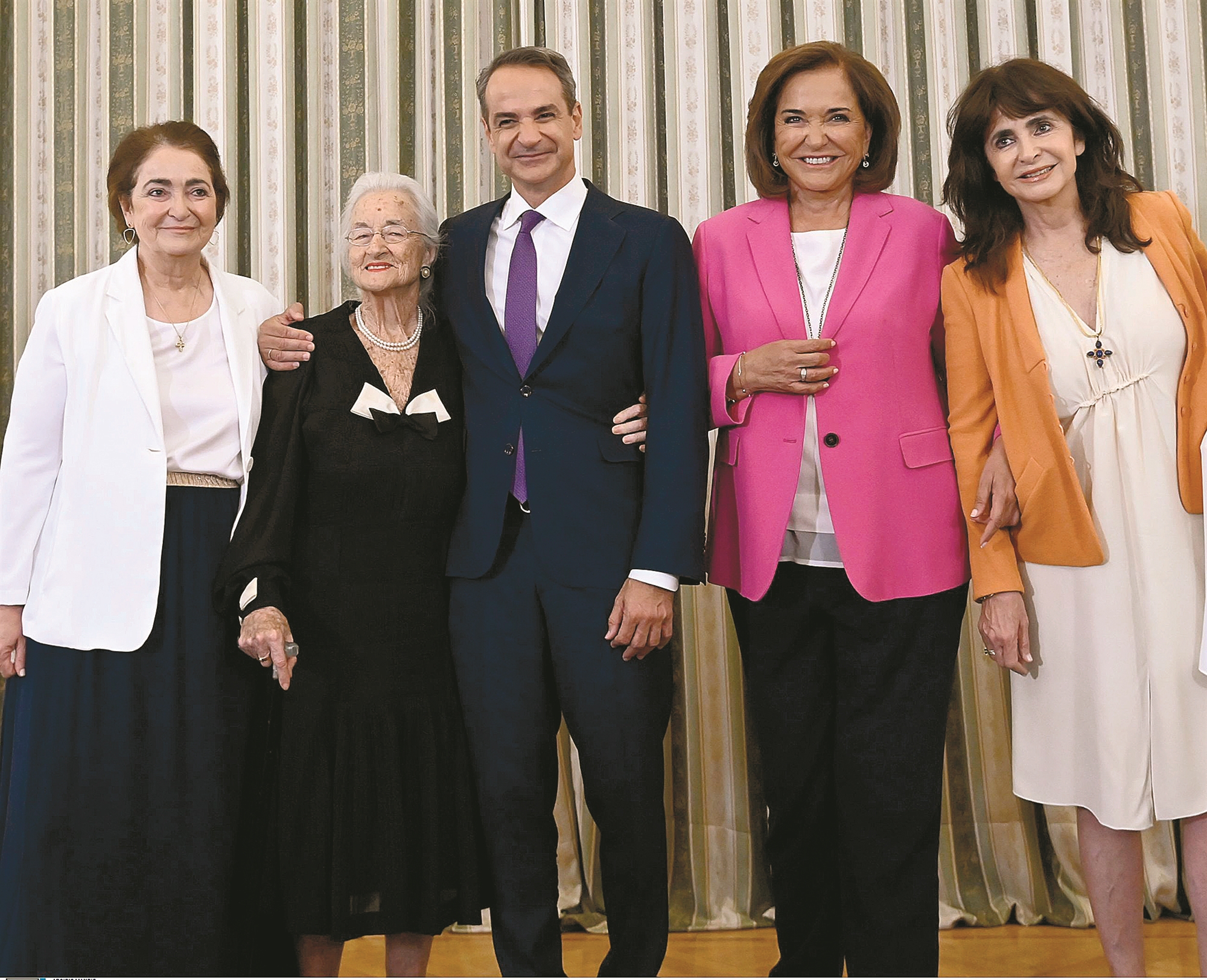
Kyriakos Mitsotakis, she adds, is more demonstrative than his father. “When he was elected prime minister, he called me: ‘Aunt, I want you at my confirmation.’ He opened his arms and gave me a big hug as soon as he saw me. He’s sweet. I also see that he is more organized than his father. What do I mean by that? That he is more technologically minded, he is a man of his era. His decisions are rational. The wish I want to send him is that he has the brains I believe he does and the strength to do what he feels is right. Kyriakos has a sense of right and wrong, and has had it for as long as I remember him, since he was a child,” she says.
And what about Mareva? Has she changed him as much as Marika changed his father? “I don’t really know Mareva very well,” admits Lymberaki. “We haven’t spent a lot of time together. I met her as a bride and I liked her a lot. She was modest and affable. She has a distinctly attractive personality. I did not get to know her well after that because of the age difference and because our social circles don’t cross.”
And what about Kostas Mitsotakis Junior? Does she see a career in politics for him? “You need to want it, to like it a lot, to sacrifice a lot. Just look at how Greece treated Eleftherios Venizelos after he doubled its territory. Politics is not honorable. There’s a lot of malice dressed as interest and the person standing beside you can betray you. If he has the determination, then so be it, but it’s up to him.”
Memories
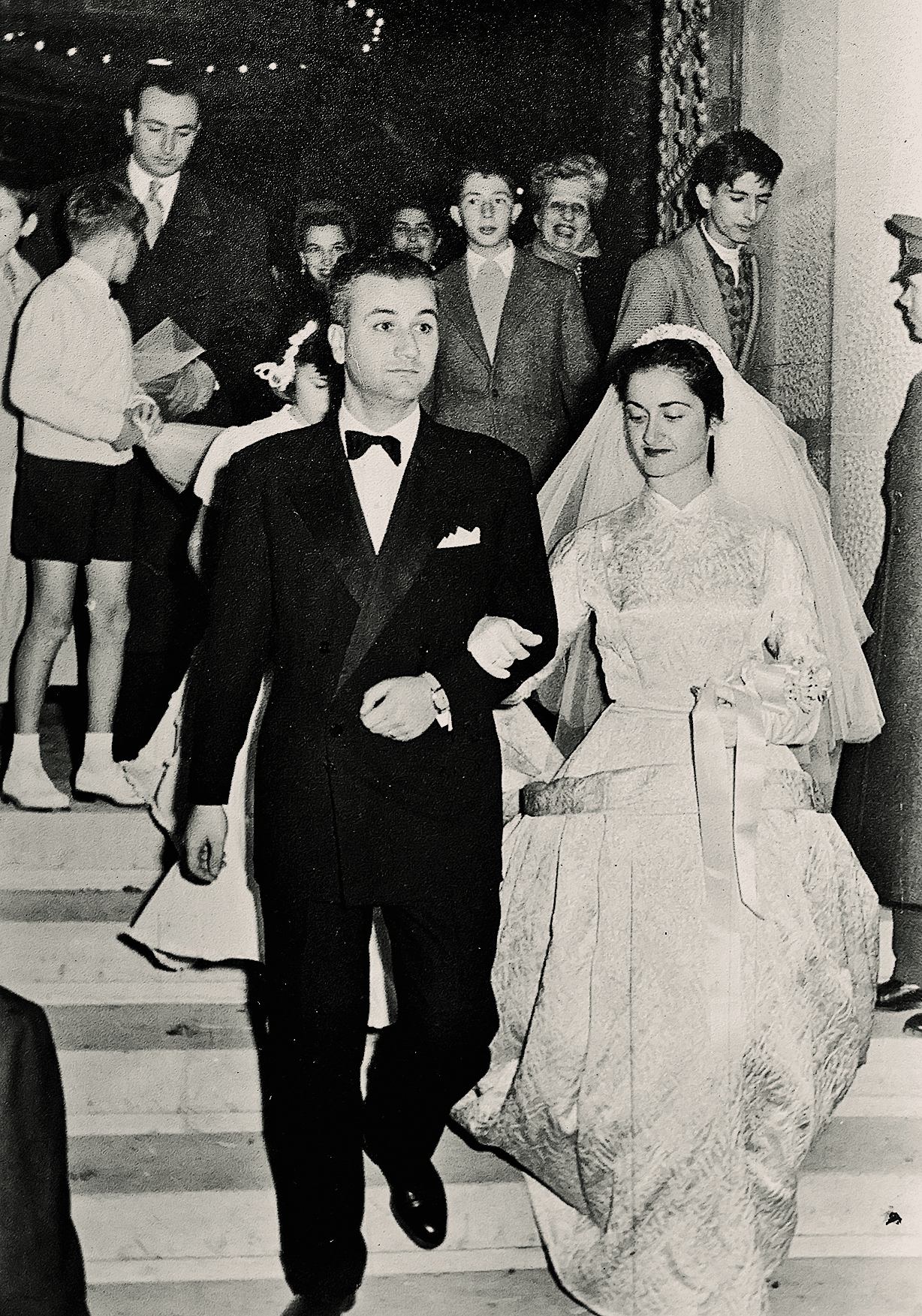 As we take a break, Lymberaki shows me some old photographs. She really was beautiful and her husband was also a handsome man. “Oh, how I have always loved beauty. I’d see the young men in Hania as I was growing up and didn’t find any of them handsome. And then Giorgos Lymberakis came along, 26 at the time, and that was it! I fell deeply in love,” she says, pointing to a series of wedding photos.
As we take a break, Lymberaki shows me some old photographs. She really was beautiful and her husband was also a handsome man. “Oh, how I have always loved beauty. I’d see the young men in Hania as I was growing up and didn’t find any of them handsome. And then Giorgos Lymberakis came along, 26 at the time, and that was it! I fell deeply in love,” she says, pointing to a series of wedding photos.
Lymberaki’s daughter, Antigone, is with us and I cannot help asking her what kind of mother Artemisia was when she was growing up. “She was so tender. We never fought even though we often disagreed. The greatest part of my upbringing, from both my parents, was that we could have different opinions on things – different points of view, without the arguments, makes life more interesting,” she says.
Mother and daughter had recently returned from a summer holiday on Crete. “I went for 50 swims, an hour each,” says Lymberaki. “At my age, you know, with all the different health complaints, swimming really is the greatest joy. Your body feels weightless, unburdened.”
About being back on her native island, she says: “Crete is my home; I am a guest in Athens.”
